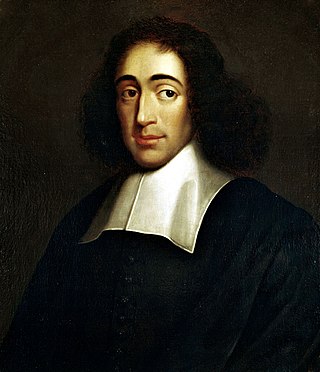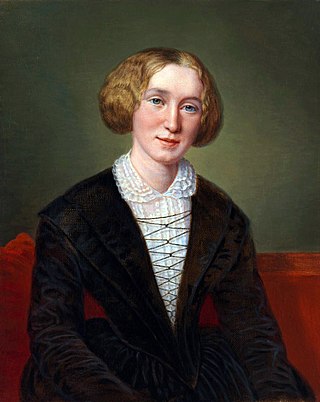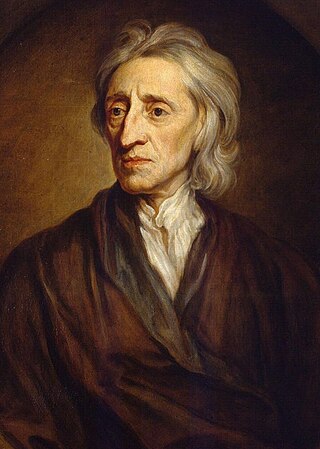Related Research Articles

Baruch (de) Spinoza, also known under his Latinized pen name Benedictus de Spinoza, was a philosopher of Portuguese-Jewish origin. As a forerunner of the Age of Enlightenment, Spinoza significantly influenced modern biblical criticism, 17th-century rationalism, and Dutch intellectual culture, establishing himself as one of the most important and radical philosophers of the early modern period. Influenced by Stoicism, Thomas Hobbes, René Descartes, and heterodox Christians, Spinoza was a leading philosopher of the Dutch Golden Age.

Mary Ann Evans, known by her pen name George Eliot, was an English novelist, poet, journalist, translator, and one of the leading writers of the Victorian era. She wrote seven novels: Adam Bede (1859), The Mill on the Floss (1860), Silas Marner (1861), Romola (1862–1863), Felix Holt, the Radical (1866), Middlemarch (1871–1872) and Daniel Deronda (1876). As with Charles Dickens and Thomas Hardy, she emerged from provincial England; most of her works are set there. Her works are known for their realism, psychological insight, sense of place and detailed depiction of the countryside. Middlemarch was described by the novelist Virginia Woolf as "one of the few English novels written for grown-up people" and by Martin Amis and Julian Barnes as the greatest novel in the English language.

John Locke was an English philosopher and physician, widely regarded as one of the most influential of Enlightenment thinkers and commonly known as the "father of liberalism". Considered one of the first of the British empiricists, following the tradition of Francis Bacon, Locke is equally important to social contract theory. His work greatly affected the development of epistemology and political philosophy. His writings influenced Voltaire and Jean-Jacques Rousseau, and many Scottish Enlightenment thinkers, as well as the American Revolutionaries. His contributions to classical republicanism and liberal theory are reflected in the United States Declaration of Independence. Internationally, Locke's political-legal principles continue to have a profound influence on the theory and practice of limited representative government and the protection of basic rights and freedoms under the rule of law.

Pantheism is the philosophical and religious belief that reality, the universe, and nature are identical to divinity or a supreme entity. The physical universe is thus understood as an immanent deity, still expanding and creating, which has existed since the beginning of time. The term pantheist designates one who holds both that everything constitutes a unity and that this unity is divine, consisting of an all-encompassing, manifested god or goddess. All astronomical objects are thence viewed as parts of a sole deity.

Thomas Hobbes was an English philosopher. Hobbes is best known for his 1651 book Leviathan, in which he expounds an influential formulation of social contract theory. He is considered to be one of the founders of modern political philosophy.
In philosophy, rationalism is the epistemological view that "regards reason as the chief source and test of knowledge" or "any view appealing to reason as a source of knowledge or justification", often in contrast to other possible sources of knowledge such as faith, tradition, or sensory experience. More formally, rationalism is defined as a methodology or a theory "in which the criterion of truth is not sensory but intellectual and deductive".

Samuel Clarke was an English philosopher and Anglican cleric. He is considered the major British figure in philosophy between John Locke and George Berkeley. Clarke's altered, Nontrinitarian revision of the 1662 Book of Common Prayer continues to influence worship among modern Unitarians.
This article contains information about the literary events and publications of 1656.

Charles Margrave Taylor is a Canadian philosopher from Montreal, Quebec, and professor emeritus at McGill University best known for his contributions to political philosophy, the philosophy of social science, the history of philosophy, and intellectual history. His work has earned him the Kyoto Prize, the Templeton Prize, the Berggruen Prize for Philosophy, and the John W. Kluge Prize.

The Tractatus Theologico-Politicus (TTP) or Theologico-Political Treatise, is a 1670 work of philosophy written in Latin by the Dutch philosopher Benedictus Spinoza (1632–1677). The book was one of the most important and controversial texts of the early modern period. Its aim was "to liberate the individual from bondage to superstition and ecclesiastical authority." In it, Spinoza expounds his views on contemporary Jewish and Christian religion and critically analyses the Bible, especially the Old Testament, which underlies both. He argues what the best roles for state and religion should be and concludes that a degree of democracy and freedom of speech and religion works best, such as in Amsterdam, while the state remains paramount within reason. The goal of the state is to guarantee the freedom of citizens. Religious leaders should not interfere in politics. Spinoza interrupted his writing of his magnum opus, the Ethics, to respond to the increasing intolerance in the Dutch Republic, directly challenging religious authorities and their power over freedom of thought. He published the work anonymously, in Latin, rightly anticipating harsh criticism and vigorous attempts by religious leaders and conservative secular authorities to suppress his work entirely. He halted the publication of a Dutch translation. One described it as being "Forged in hell by the apostate Jew working together with the devil". The work has been characterized as "one of the most significant events in European intellectual history", laying the groundwork for ideas about liberalism, secularism, and democracy.
Early modern philosophy The early modern era of philosophy was a progressive movement of Western thought, exploring through theories and discourse such topics as mind and matter, is a period in the history of philosophy that overlaps with the beginning of the period known as modern philosophy. It succeeded the medieval era of philosophy. Early modern philosophy is usually thought to have occurred between the 16th and 18th centuries, though some philosophers and historians may put this period slightly earlier. During this time, influential philosophers included Descartes, Locke, Hume, and Kant, all of whom contributed to the current understanding of philosophy.
Quentin Robert Duthie Skinner is a British intellectual historian. He is regarded as one of the founders of the Cambridge School of the history of political thought. He has won numerous prizes for his work, including the Wolfson History Prize in 1979 and the Balzan Prize in 2006. Between 1996 and 2008 he was Regius Professor of History at the University of Cambridge. He is the Emeritus Professor of the Humanities and Co-director of The Centre for the Study of the History of Political Thought at Queen Mary University of London.
Charles Blount was an English deist and philosopher who published several anonymous essays critical of the existing English order.
Warren Montag is a professor of English at Occidental College in Los Angeles, California. He is known primarily for his work on twentieth-century French theory, especially Althusser and his circle, as well as his studies of the philosophers Spinoza, Locke, and Hobbes.

In the philosophy of Baruch Spinoza, conatus is an innate inclination of a thing to continue to exist and enhance itself. This thing may be mind, matter, or a combination of both, and is often associated with God's will in a pantheist view of nature. The conatus may refer to the instinctive will to live of living organisms or to various metaphysical theories of motion and inertia. Today, conatus is rarely used in the technical sense, since classical mechanics uses concepts such as inertia and conservation of momentum that have superseded it. It has, however, been a notable influence on later thinkers such as Arthur Schopenhauer and Friedrich Nietzsche.

Alfred Edward Taylor, usually cited as A. E. Taylor, was a British idealist philosopher most famous for his contributions to the philosophy of idealism in his writings on metaphysics, the philosophy of religion, moral philosophy, and the scholarship of Plato. He was a fellow of the British Academy (1911) and president of the Aristotelian Society from 1928 to 1929. At Oxford he was made an honorary fellow of New College in 1931. In an age of universal upheaval and strife, he was a notable defender of Idealism in the Anglophone world.
John Keill FRS was a Scottish mathematician, natural philosopher, and cryptographer who was an important defender of Isaac Newton.
De Corpore is a 1655 book by Thomas Hobbes. As its full Latin title Elementorum philosophiae sectio prima De corpore implies, it was part of a larger work, conceived as a trilogy. De Cive had already appeared, while De Homine would be published in 1658. Hobbes had in fact been drafting De Corpore for at least ten years before its appearance, putting it aside for other matters. This delay affected its reception: the approach taken seemed much less innovative than it would have done in the previous decade.
Robert Payne (1596–1651) was an English cleric and academic, known also as a natural philosopher and experimentalist. He was associated with the so-called Welbeck Academy by his position as chaplain to William Cavendish, 1st Earl of Newcastle. The position also brought him a close friendship with Thomas Hobbes.
This is a timeline of philosophy in the 17th century.
References
- ↑ Curley, Edwin (31 March 2020). A Spinoza Reader: The Ethics and Other Works. Princeton University Press. p. xii. ISBN 978-0-691-20928-9.
- ↑ Peter France, ed. (2000). The Oxford Guide to Literature in English Translation. Oxford University Press. p. 507. ISBN 9780198183594.
- ↑ Alfred Edward Taylor (1908). Thomas Hobbes. London: A. Constable. p. 19.
- ↑ Sarah Hutton (2015). British Philosophy in the Seventeenth Century. Oxford: Oxford University Press. p. 197. ISBN 9780191059506.
- ↑ James H. Grayson (2013). Korea: A Religious History. Milton Park, United Kingdom: Taylor and Francis. p. 120. ISBN 9781136869181.